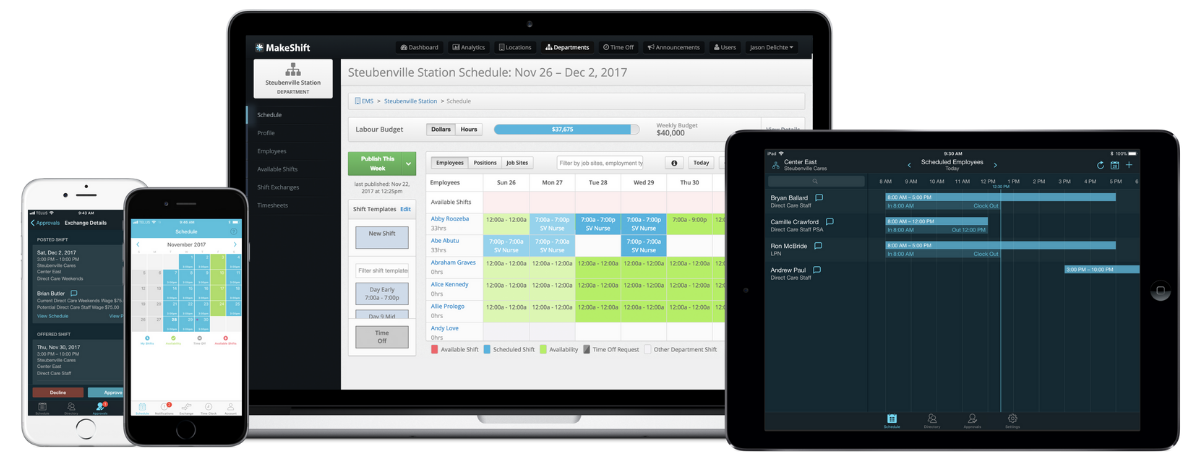“There are 2 key points that you must understand if you have to be HIPAA compliant... First, it’s a journey, not a destination…Second, one size fits all doesn’t truly fit anyone.” — Marc Haskelson, President and CEO Compliancy Group.
What a journey, right?
You do your best to adhere to HIPAA regulations while running a quality healthcare facility that prioritizes employee well-being and top-notch patient care.
But what happens when fatigue, miscommunication, or scheduling mishaps come into play? Things get tricky, and HIPAA violations may be lurking around the corner.
The dynamic relationship between staff scheduling and HIPAA compliance is a rarely addressed topic. Would you be surprised to learn that proper scheduling can be the unsung hero in maintaining privacy and security in healthcare settings?
Keep reading as we address the link between the 2 and how you can harness the power of smarter staff scheduling to support HIPAA compliance in your facility.
- What is HIPAA Compliance?
- What Do Staff Scheduling and HIPAA Compliance Have in Common?
- MakeShift Staff Scheduling Supports HIPAA Compliance
What is HIPAA Compliance?
The Health Insurance Portability and Accountability Act, aka HIPAA, is a set of rules and safeguards to keep private health information safe and secure.
HIPAA governs any company dealing with protected health information (PHI) and requires security measures to protect their patients’ privacy.
You’re subject to HIPAA compliance requirements if you’re involved in:
- Providing treatment
- Handling patient payments
- Other healthcare operations (e.g.: administrative, legal, quality improvement…etc.)
And not being HIPAA compliant is a big deal.
It can lead to financial losses, legal troubles, damage to reputation, and a loss of trust from both patients and partners.
There’s been an upward trend in data breaches over the past 14 years.
Healthcare accounts for 79% of all reported data breaches. In 2020, 599 reported data breaches affected 26 million people in the healthcare industry — hacking or IT incidents accounted for 58% of those breaches.
What Do Staff Scheduling and HIPAA Compliance Have in Common?
Staff scheduling plays a critical role in supporting and enforcing HIPAA compliance within healthcare organizations. It helps ensure PHI access is controlled, employees are educated and trained, and security measures are in place to protect patient data.
Proper staff scheduling promotes a culture of privacy and security in healthcare settings.
Here’s how you can ensure your staff scheduling helps you remain HIPAA compliant:
1. Access Control
HIPAA requires healthcare organizations to implement access controls, ensuring ONLY authorized individuals can access PHI. Access to PHI should be limited to employees whose job roles require it.
Staff scheduling is closely tied to access control through scheduling who works when and in what capacity.
Staff scheduling software allows you to create skill-based schedules and easily build out rotation templates.
- Skill Matching — Scheduling by skills ensures you have the right professionals in place to handle specific patient cases. This minimizes unnecessary data access and helps prevent employees from accessing patient info that doesn't pertain to their expertise.
For example, a skilled pediatric nurse will be scheduled for pediatric cases, reducing the chances of inappropriate access to adult patient records. - Rotation Scheduling — Implementing rotation schedules, like rotating staff through different departments or shifts, can help prevent overexposure to patient data.
HIPAA compliance encourages the "minimum necessary" principle — employees should only access the minimum amount of patient data required for their job tasks.
Rotation scheduling can limit the amount of data any one staff member has access to at any given time. The variation in responsibilities reduces the risk of an employee having continuous and unrestricted access to extensive patient data over an extended period.
2. Training and Education
HIPAA mandates that healthcare staff receive regular training on privacy and security practices.
Note: Although HIPAA rules don’t set a specific frequency for this ongoing training, a good rule of thumb is to require certification training annually for your staff.
Thoughtful shift planning is essential to ensure your employees have time to attend these training sessions without disrupting patient care or their work/life balance.
Of course, your main HR platform will remind your employees about their training eligibility and upcoming required training. But, if you’re a forward-thinking thought leader, you’ve already streamlined staff scheduling with software, and your employees’ eligibility will sync between the 2 solutions.
Give yourself a high-five. ✋
Because you can use this information to schedule eligible employees and keep the ineligible ones off the schedule until they get recertified.
3. Breaks, Rest Periods, and Overtime Management
Employee fatigue can lead to judgment lapses and potential HIPAA violations. Let’s look at 3 examples:
- Loss of focus on privacy protocols — An exhausted nurse may become less attentive to privacy protocols and security measures. They might overlook important steps in verifying patient identities or maintaining secure access to electronic health records, increasing the chances of unauthorized access.
- Failure to Report Incidents Promptly — A tired employee who’s logged excessive overtime may delay or forget to report security incidents or breaches, as HIPAA requires. Delays in reporting can hinder your organization's ability to respond effectively and in a timely manner, potentially leading to more extensive violations.
- Lack of Diligence in Handling Records — Fatigue could cause an overworked employee to be less diligent in physically safeguarding patient records. They may forget to log out of computer systems, leave printed records unattended, or fail to properly secure physical file, increasing the risk of unauthorized access.
Sufficient breaks and time off help prevent burnout, reducing the risk of mistakes that could compromise patient data security.
Staff scheduling software can automate break scheduling and overtime alerts to ensure employees receive regular breaks and aren’t scheduled for too much overtime.
An added benefit of prioritizing your staff’s rest and well-being is that they tend to stick around longer. Overworked employees are 2.6 times more likely to leave their jobs than employees with a healthy work-life balance.

4. Cross-Training
Cross-training employees can benefit workload distribution, but it's crucial that cross-trained staff members are aware of HIPAA regulations for all their roles.
Be sure to allocate sufficient time for thorough training.
When your staff scheduling software is synced with your LMS, you’ll be able to see who’s attended training and who hasn’t. Use that info to create a schedule that keeps you on the right side of HIPAA compliance.
✶Added Bonus✶ If you’re still manually creating schedules and wasting time sifting through employee eligibility and availability, integrated scheduling software can help you reclaim some of your workday.
On average, managers spend 20% of their time manually creating employee schedules. In a 40-hour work week, that’s almost a full day each week consumed by schedule management.
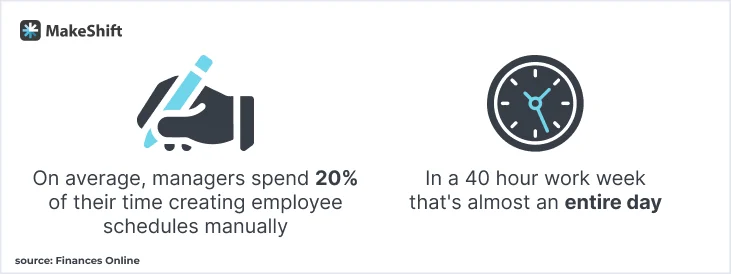
5. Communication
Effective communication is vital for maintaining HIPAA compliance. Schedule regular team meetings and updates to ensure your staff members are informed about changes in policies, procedures, or regulations related to HIPAA.
It helps with HIPAA compliance and can improve your healthcare staff’s cohesiveness and boost employee retention.
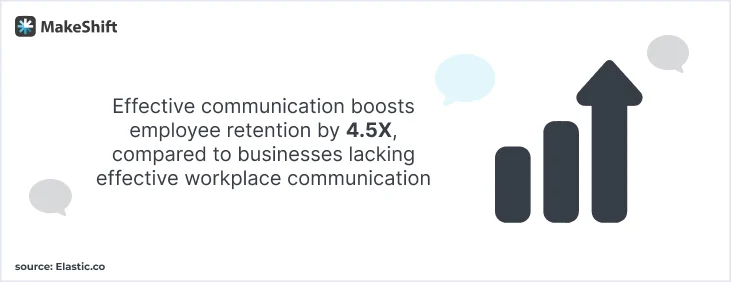
Stellar communication ups employee retention by 4.5 times compared to businesses that drop the ball when it comes to workplace communication.
Staff scheduling software can facilitate communication through messaging and alerts. For example, it can send automated team-wide reminders for mandatory staff meetings focused on compliance.
MakeShift Staff Scheduling Supports HIPAA Compliance
Effective staff scheduling is pivotal in healthcare, ensuring the right personnel are available when needed for patient care. Proper staff scheduling supports operational efficiency and safeguarding of sensitive patient data in compliance with HIPAA.
MakeShift Scheduling uses automation to streamline scheduling processes while providing high-level support for maintaining HIPAA compliance.
From automating shift assignments to seamless HR solution integration, MakeShift optimizes healthcare staff scheduling while enhancing the overall employee experience.
MakeShift offers AI automation and enhanced employee experience
Rather than an all-in-one solution, MakeShift offers superior staff scheduling that enhances your other HIPAA-compliant software solutions.
You don’t have to fret about patient data or reports stored in MakeShift because they’re not. MakeShift offers streamlined simplicity in the form of smarter staff scheduling to support HIPAA compliance in your healthcare facility.
We do this in 2 ways:
1. Automation — Instead of manually creating schedules, which can be time-consuming and error-prone, automation can consider factors like employee availability, skills, and workload requirements to generate schedules quickly and efficiently.
Introducing ShiftMate AI (phased rollout 2023-2024) — Go beyond predicting, automating, and building your staff schedules. With ShiftMate's suite of generative AI-powered modules, you can finally optimize your operations for success and employee wellness.
Available features:
- Smart Support - 24/7 scheduling assistance for you & your employees. Plus, step-by-step instructions and accessible scheduling tips.
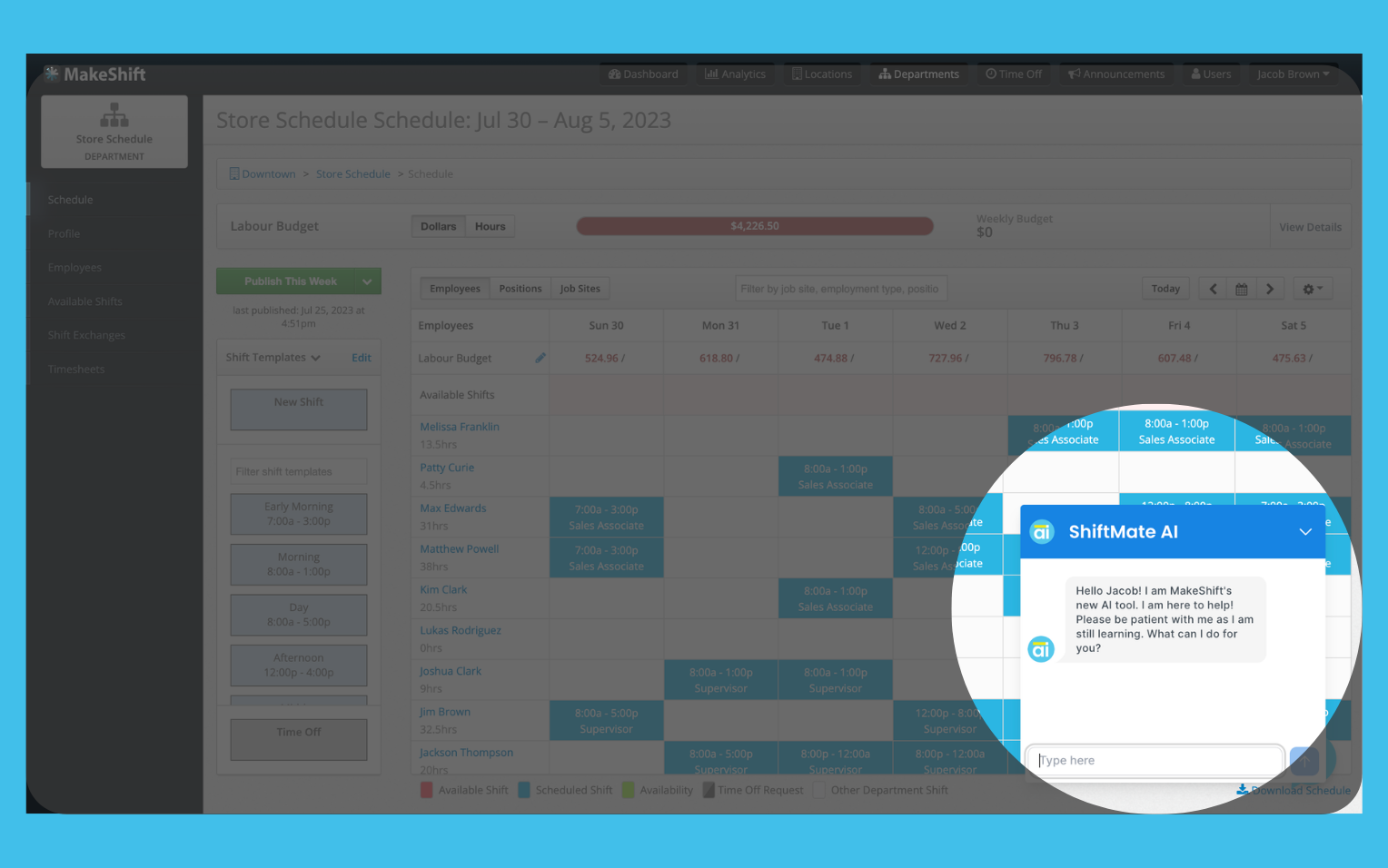
- ShiftPredict - Using AI technology from Ikigai Labs, ShiftPredict accurately identifies patterns like patient volume in healthcare, to predict your future schedule & support HIPAA Compliance.
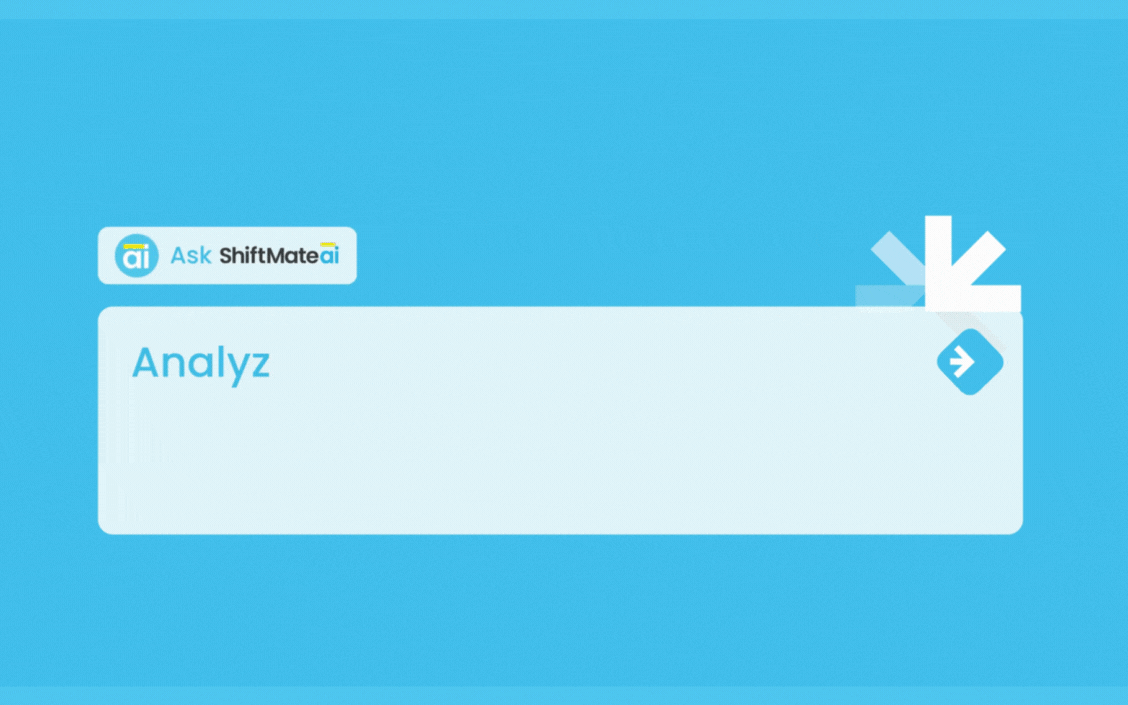
2. Employee Experience — Effective staff scheduling improves the employee experience by providing predictability and flexibility.
- Self-Service Access: Nurses can access their schedules, request time off, and manage their availability, providing them with greater control and convenience.
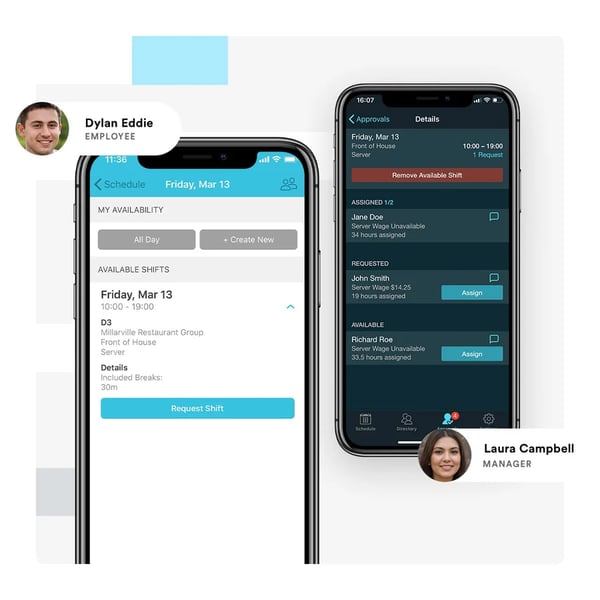
- Transparent Communication — Facilitates transparent communication among staff members and administrators, promoting a collaborative work environment.
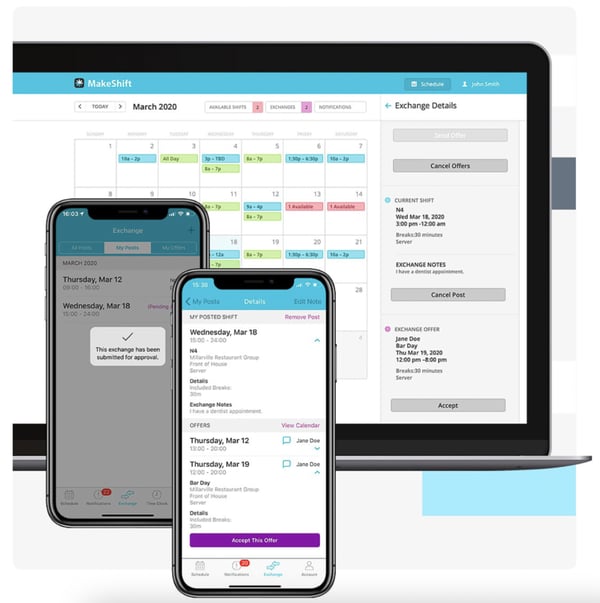
- A schedule in their pocket — Allows employees to access their schedules and communicate on the go, improving work-life balance.
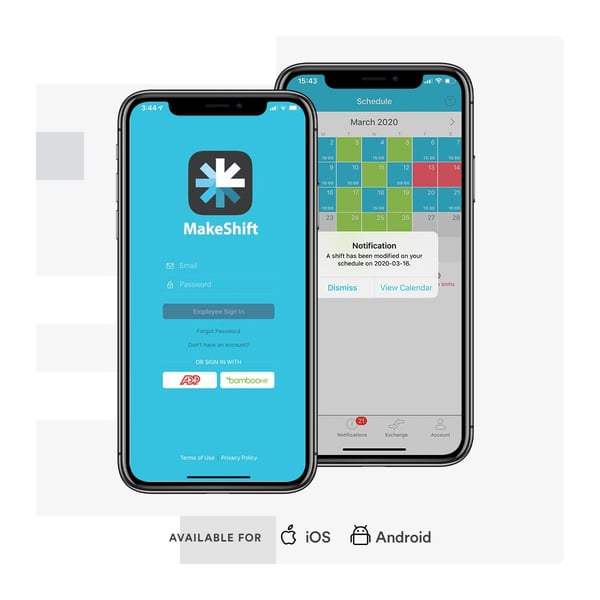
Embracing the Future: The Vital Role of Staff Scheduling in HIPAA Compliance
In the complex world of healthcare, where every second counts, the importance of maintaining HIPAA compliance can’t be overstated.
Patient privacy and data security are paramount — the right staff scheduling practices can be the linchpin in achieving these.
Staff scheduling plays a multifaceted role in the healthcare ecosystem. It's not just about filling shifts — it's about fostering a culture of privacy, ensuring access control, promoting education and training, and mitigating the risks associated with fatigue and miscommunication.
If you're ready to unlock the power of staff scheduling to support HIPAA compliance and take your healthcare operations to the next level, you’re in the right place.
Schedule a demo with our support team today. We’ll be happy to walk you through how MakeShift can improve the employee experience in your healthcare facility.




